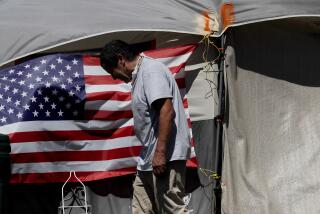Virtual veteran to help grad students learn
Petty Officer Sarax shifts in his seat as a therapist asks him about the wartime experiences that are causing strain with his wife.
“There are some things that I just don’t want to talk about with her and she keeps pushing,” he says. “… I lost a couple of friends over there. It was bad.”
Sarax could be one of many veterans who are struggling to cope with the stress and trauma of war. But he is in fact a computer simulation.
Researchers at USC hope that virtual clients like Sarax will help social workers learn to interact with military personnel and identify the signs of post-traumatic stress disorder. It is one of the ways that the university’s School of Social Work is harnessing technology to improve care for returning veterans and help head off a looming crisis.
Since Sept. 11, 2001, more than 2 million U.S. troops have deployed to Iraq and Afghanistan. Nearly a third report symptoms of PTSD, severe depression or traumatic brain injury when they return, according to a 2008 study by Rand Corp.
“This, as everybody knows, exceeds the capacity of the existing institutions or the existing professional workforce” in both military and civilian settings, said Marilyn Flynn, dean of the USC School of Social Work.
The school was the first in the nation to offer a graduate specialization in military social work. The program, unveiled in 2008, is now available to students across the country through the school’s new Virtual Academic Center.
Schools of social work have tended to shy away from distance education because students need to learn clinical skills, said Vice Dean R. Paul Maiden. But, he said, technology now allows for live interaction between students and teachers.
For a recent class, assistant professor Dorian Traube emailed her students two cases involving abusive parents that were ripped from news headlines. She then logged onto the Virtual Academic Center’s teaching platform from her office computer.
As students dialed in, their faces appeared in boxes on her screen like in the TV show “Hollywood Squares.” Traube spoke to them using a headset and webcam, then moved them into break-out groups, where they practiced interviewing a client by acting out the cases.
Dana O’Dell, 39, who left the Army after suffering a spinal injury during the Persian Gulf War, joined the class from Fort Wayne, Ind. She is finding her sessions at the Virtual Academic Center even more engaging than ones at the brick-and-mortar institution where she obtained her bachelor’s degree.
“All the distractions are gone,” she said — and there is no hiding at the back of the classroom.
Left untreated, war’s invisible wounds can have far-reaching consequences. They can disrupt relationships with spouses and children and cause problems at work. Afflicted people are more likely to abuse drugs and alcohol, become homeless or attempt suicide.
The departments of Veterans Affairs and Defense have promised unprecedented amounts of mental health screening and counseling for returning veterans and their families. But they need more providers, particularly in remote locations.
The Army says about 12% of its behavioral health posts — which include psychologists, psychiatrists, psychiatric nurses, social workers and others — are vacant. In the Navy, which also provides services for the Marine Corps, the figure is about 13%. The Air Force is at full strength in most fields, but needs psychologists.
The staffing shortages are aggravated by high burnout rates among providers who work with military personnel, Maiden said.
Brock McNabb, 34, who attends the Virtual Academic Center from Cupertino in the Bay Area, deployed twice to Iraq as an Army medic. During his second tour in 2006-07, the Army did not have enough mental health technicians, so he found himself working under a psychologist at a Baghdad aid station.
“I didn’t know anything about mental health,” he said.
The three-member team was responsible for about 20,000 soldiers. They included men who had seen their buddies burn horribly to death in roadside bombings, and men who put out the fires and collected the remains.
“I was working 12- to 15-hour days, every day. There was no break,” McNabb said. One day, it became too much.
“I remember, I had in mind: I’m going to blow my head off,” he said. “I’m going to eat my 9-mm and lights out.”
What saved him, he said, was habit. As on every other day, he walked back to his room at the end of his shift, dropped his gun on a shelf near the door and collapsed onto his bed. He was lying there when he realized: “Oh, crap. I forgot to kill myself.”
Too exhausted to get up again, he fell asleep. When he woke up, he said, the suicidal urge was gone.
Even when help is available, the providers are often unfamiliar with military culture or how to address combat-related issues such as PTSD, Maiden said.
One veteran abandoned counseling for a year after confiding in a therapist about the day his friend was killed by a rocket-propelled grenade, McNabb said. The therapist thought he was talking about a small car.
Social workers are often the first providers to interact with veterans like these and can get them the services they need, said Anthony Hassan, a retired Air Force officer who heads the USC school’s Center for Innovation and Research on Veterans and Military Families.
His center is collaborating with the Institute for Creative Technologies at USC to develop virtual military clients like Sarax. Instructors can manipulate their uniform, rank, gender, ethnicity and responses, Hassan said. Prototypes are also being developed with voice recognition capabilities, so students can practice on their own, he said.
About 85 students are enrolled in the school’s military social work specialization, which includes classes about PTSD and military culture. Others are taking the classes as electives. Later this year, the school plans to start offering a certificate course for experienced therapists who want to learn about working with the military community.
Hoping to draw more veterans and family members into the profession, the School of Social Work opened a campus in San Diego in 2009 and enlisted a former Marine master gunnery sergeant to help recruit students. The Virtual Academic Center, which opened in the fall, is accredited in 38 states, an advantage for military families who move frequently.
McNabb fits classes into a busy schedule doing outreach for the Department of Veterans Affairs. When he completes a master’s degree in social work, he wants to continue working for the VA or go back into the military.
“There is such a huge need,” he said. “With that MSW, I can go out and instill a lot of hope.”
More to Read
Sign up for Essential California
The most important California stories and recommendations in your inbox every morning.
You may occasionally receive promotional content from the Los Angeles Times.










